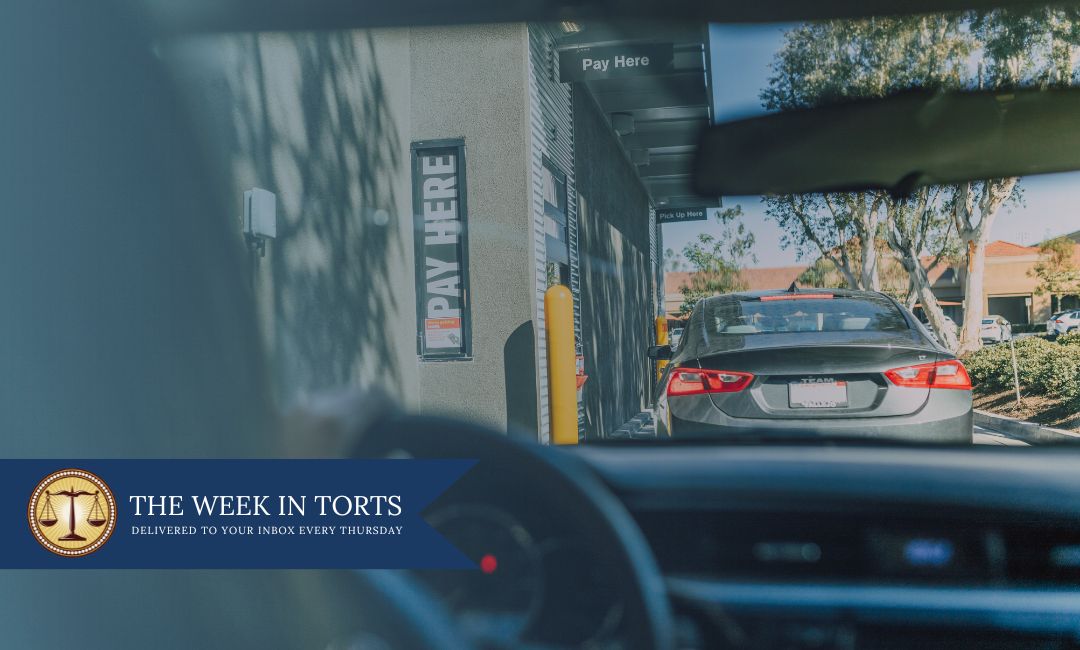The Week In Torts – Cases from February 9, 2024

Were those errands for work?
FLORIDA LAW WEEKLY
VOLUME 49, NUMBER 6
CASES FROM THE WEEK OF FEBRUARY 9, 2024
TRIAL COURT ERRED IN GRANTING SUMMARY JUDGMENT IN FAVOR OF DEFENDANT BASED ON ITS DETERMINATION THAT THE DRIVER WAS NOT IN THE COUSE AND SCOPE OF HER EMPLOYMENT AT THE TIME OF THE CRASH.
Kulzer v. Way, 49 Fla. L. Weekly D300 (Fla. 5th DCA Fed. 2, 2024):
The Defendant was running various errands at the time of the accident. Some were clearly for her job, but it was not clear if they all were. She worked for a company that inspected and rented condominiums and their contents in preparation for sale.
After completing two of the errands, the woman grabbed a hamburger which she ate in the parking lot of McDonald’s. She was then heading back to one of the condominiums for a business meeting, when she negligently collided with the plaintiff.
The appeal arose after the trial court entered summary judgment, finding as a matter of law that the defendant was not within the course and scope of her employment based on the “coming and going” rule.
The defendant normally resided and worked in Michigan but was temporarily assigned to work in Ormond Beach. She was involved with inspecting a condominium unit, dealing with some of its contents and helping to prepare it for marketing, listing and sale.
The parties agreed that the driver’s first errand was unquestionably within the course and scope of her employment. There was little in the record about the second errand, which the driver went on one hour after the first errand. There was no dispute in the record that after the McDonald’s stop, the employee was on her way back for a business meeting at the condo.
When an employee is on a single purpose personal lunch break away from the workplace and is not engaged in the employer’s business in any manner, the employee is not considered to be within the scope of employment in the worker’s compensation arena.
However, applying the Sussman test for an employer’s vicarious liability, an employee is considered in the course and scope only if (1) the conduct is of the kind that the employee is hired to perform; (2) the conduct occurs substantially within the time and place limits authorized or required by the work to be performed; and (3) the conduct is activated at least in part by a purpose to serve the master.
In evaluating this test, the plaintiff met prong one. There was also evidence that prong three was met. However, prong two was poorly developed, leaving questions of material fact.
Because a trial court may only grant summary judgment when there are no genuine issues of material fact, the record here did not entitle the defendant to judgment as a matter of law.
MUST PRESERVE THE SPECIFIC LEGAL GROUND FOR THE ISSUE IN ORDER TO APPEAL
Monzón v. RJ Reynolds, 49 Fla. L. Weekly D276 (Fla. 3rd DCA JAN. 31, 2024):
To preserve an issue for appeal, the specific legal ground upon which the claim is based must be raised at trial. Raising an issue alone is not enough; courts will not entertain an argument that underlies the issue on appeal unless the party made the same argument in the trial court.
Courts review unpreserved challenges to evidence on appeal for fundamental error, which means that the issue goes to the foundation of the case and not allowing review would amount to a denial of due process. Fundamental error is found only in rarest cases; e.g., where a jurisdictional error appears, or where the interest of justice presents a compelling demand for its application.
The court reviews a decision involving a jury instruction for abuse of discretion, and the court will not overturn the ruling on appeal absent a showing of prejudicial error.
COURT REVERSES ADDITUR AND REINSTATES JURY’S VERDICT.
Garrow v. Antonietta, 49 Fla. L. Weekly D292 (Fla. 5th DCA Fed. 2, 2024):
The trial judge granted the Plaintiff’s motion for additur under §768.043. The defendants rejected the additur, and the trial court granted a new trial, limited solely to claims for past and future non-economic damages and future loss of consortium.
Damages for pain and suffering are difficult to calculate and have no set standard for measurement. This is why awards are uniquely in the province of the jury to decide. A trial court has the limited authority to grant an additur, but only when the facts and circumstances presented to the trier of fact make clear that the money damages awarded were clearly inadequate.
Appellate courts review an award of additur for an abuse of discretion. The appellate court considers discretion abused when the evidence at trial conflicts, the jury reaches its verdict after resolving those conflicts, and then the trial court interferes with the jury’s verdict.
In this case, the evidence did conflict, and therefore, the court found that the jury’s awards were consistent with the evidence, and the trial court erred in granting an additur.
Additionally, the plaintiffs filed their motion for appellate attorney’s fees after the time for service of the reply brief, rendering the motion untimely.
UNDER LAW OF THE CASE DOCTRINE, TRIAL COURT ERRED IN ALLOWING THE PLAINTIFF TO FILE AN AMENDED COMPLAINT, WHERE THE TRIAL COURT HAD PREVIOUSLY DISMISSED SUBSTANTIALLY SIMILAR CLAIMS AS TO THOSE RAISED IN THE NEW COMPLAINT WITH PREJUDICE, AND THE APPELLATE COURT HAD AFFIRMED THE DISMISSAL ON APPEAL
Talmage v. Conner, 49 Fla. L. Weekly D293 (Fla. 5th DCA Fed. 2, 2024).

